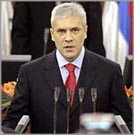Serbia's Tadic calls for talks to resolve Kosovo independence
 New York - Serbian President Boris Tadic told the UN Security Council Monday that only renewed talks can resolve the "bad situation" resulting from Kosovo's declaration of independence.
New York - Serbian President Boris Tadic told the UN Security Council Monday that only renewed talks can resolve the "bad situation" resulting from Kosovo's declaration of independence.
Tadic made yet another appearance before the 15-nation Security Council, but this time behind closed doors, to plead again for UN action to stop the independence of Kosovo, which Serbia still considers its province.
Tadic reiterated the position taken by Belgrade never to recognize Kosovo's independence, declared in February, but he said he was keen to seek a "stable solution that would mend the very bad situation caused by the unilateral decision of Kosovo's Provisional Institutions."
"Serbia continues to believe that only through resuming negotiations we can arrive at a mutually acceptable and sustainable solution, which will bring lasting peace to all the peoples of the Balkans," he said.
"The Security Council is the only institution that can bring a legally valid decision."
The Security Council had closed off the possibility of dialogue to resolve the dispute between Belgrade and Pristina last year, saying that their differences were irreconcilable.
Tadic called on the 35 countries that so far have recognized Kosovo's independence - including the United States and most of the European Union - to rescind their decisions, which he claimed have dealt a "significant blow" to UN credibility.
"Serbia cautions that unless a compromise solution is found, the case of Kosovo will become a dangerous precedent, and that situation may open a Pandora's box with unforeseeable consequences with regard to similar cases in many parts of the world," Tadic warned.
Despite Tadic's harsh language, diplomats said that Tadic and Kosovo's Prime Minister Hashim Thaci, who also met with the Security Council, offered plans to protect their own populations. A small community of Serbs still lives in northern Kosovo.
Kosovo's newly adopted constitution will enter into force on June 15, which Belgrade fears may further increase tensions in the region.
UN Secretary General Ban Ki-moon has urged the Security Council to consider readjusting the mandate of the UN mission in Kosovo to deal with developments in that territory, which is still not a full- fledged state and remains claimed by Serbia as its territory.
British Ambassador John Sawers told reporters that Tadic's proposal for negotiations to resolve future issues proved that Serbia can work for a peaceful settlement.
Sawers said Thaci has committed to bring all Kosovars together, including minorities, for their protection.
"These are very important commitments from both sides," Sawers said. "It's going to be a very difficult period ahead. It remains that Serbia and Russia have refused to accept the reality in Kosovo. But we need to move forward in recognition of the perspectives and ensure that stability, peace and good governance will prevail in Kosovo."
US Ambassador Zalmay Khalilzad said that the Security Council was encouraged by progress made in Kosovo with the assistance of the UN mission in Kosovo. But he pointed out some violent incidents that have occurred in the months since Kosovo's independence.
"It's imperative that Serbia do all it can to restrain the violence, and we were encouraged by the Serbian president saying that he supports only non-violent means to settle the issues," Khalilzad said. (dpa)